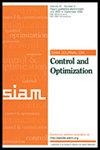Lyapunov-Krasovskii 函数不等式的验证方法
IF 2.4
2区 数学
Q2 AUTOMATION & CONTROL SYSTEMS
引用次数: 0
摘要
SIAM 控制与优化期刊》第 62 卷第 2 期第 877-902 页,2024 年 4 月。 摘要。我们研究了 Lyapunov-Krasovskii 函数(LKF)的参数化,以分析线性时延系统的稳定性。我们讨论了延迟 Lyapunov 矩阵的解,它构建了一个与规定时间导数相关的 LKF,并将其与 LKF 数值计算中常用的方法联系起来。然后,我们比较了两种基于半定量编程的时延系统稳定性分析方法,即基于积分不等式的方法和基于平方和编程的方法,这两种方法是最近出现的基于优化的 LKF 计算方法。我们讨论了它们的主要假设,并建立了这两种方法之间的联系。最后,我们提出了一种基于投影的方法,允许我们使用一般函数集来参数化 LKF,从而涵盖了文献中的多项式函数集。我们用数值示例说明了所提出的稳定性条件的解决方案以及作为稳定性证明的相应 LKF 的构建。本文章由计算机程序翻译,如有差异,请以英文原文为准。
Verification Methods for the Lyapunov–Krasovskii Functional Inequalities
SIAM Journal on Control and Optimization, Volume 62, Issue 2, Page 877-902, April 2024.
Abstract. We study parameterizations of Lyapunov–Krasovskii functionals (LKFs) to analyze the stability of linear time-delay systems. We discuss the solution to the delay Lyapunov matrix, which constructs an LKF associated with a prescribed time derivative, and relate it to the approaches commonly used in the numerical computation of LKFs. We then compare two approaches for the stability analysis of time-delay systems based on semidefinite programming, namely the method based on integral inequalities and the method based on sum-of-squares programming, which have recently emerged as optimization-based methods to compute LKFs. We discuss their main assumptions and establish connections between both methods. Finally, we formulate a projection-based method allowing us to use general sets of functions to parameterize LKFs, thus encompassing the sets of polynomial functions in the literature. The solutions of the proposed stability conditions and the construction of the corresponding LKFs as stability certificates are illustrated with numerical examples.
Abstract. We study parameterizations of Lyapunov–Krasovskii functionals (LKFs) to analyze the stability of linear time-delay systems. We discuss the solution to the delay Lyapunov matrix, which constructs an LKF associated with a prescribed time derivative, and relate it to the approaches commonly used in the numerical computation of LKFs. We then compare two approaches for the stability analysis of time-delay systems based on semidefinite programming, namely the method based on integral inequalities and the method based on sum-of-squares programming, which have recently emerged as optimization-based methods to compute LKFs. We discuss their main assumptions and establish connections between both methods. Finally, we formulate a projection-based method allowing us to use general sets of functions to parameterize LKFs, thus encompassing the sets of polynomial functions in the literature. The solutions of the proposed stability conditions and the construction of the corresponding LKFs as stability certificates are illustrated with numerical examples.
求助全文
通过发布文献求助,成功后即可免费获取论文全文。
去求助
来源期刊
CiteScore
4.00
自引率
4.50%
发文量
143
审稿时长
12 months
期刊介绍:
SIAM Journal on Control and Optimization (SICON) publishes original research articles on the mathematics and applications of control theory and certain parts of optimization theory. Papers considered for publication must be significant at both the mathematical level and the level of applications or potential applications. Papers containing mostly routine mathematics or those with no discernible connection to control and systems theory or optimization will not be considered for publication. From time to time, the journal will also publish authoritative surveys of important subject areas in control theory and optimization whose level of maturity permits a clear and unified exposition.
The broad areas mentioned above are intended to encompass a wide range of mathematical techniques and scientific, engineering, economic, and industrial applications. These include stochastic and deterministic methods in control, estimation, and identification of systems; modeling and realization of complex control systems; the numerical analysis and related computational methodology of control processes and allied issues; and the development of mathematical theories and techniques that give new insights into old problems or provide the basis for further progress in control theory and optimization. Within the field of optimization, the journal focuses on the parts that are relevant to dynamic and control systems. Contributions to numerical methodology are also welcome in accordance with these aims, especially as related to large-scale problems and decomposition as well as to fundamental questions of convergence and approximation.

 求助内容:
求助内容: 应助结果提醒方式:
应助结果提醒方式:


